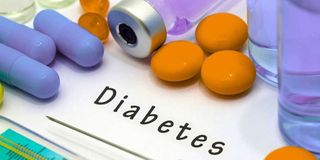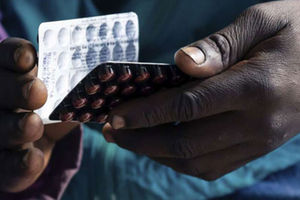Why people with diabetes are more susceptible to Covid-19

What you need to know:
- Diabetes Type 1 and Type 2 expose patients to more severe Covid-19 and higher mortality rates.
- But even without a previous diagnosis of diabetes, having abnormally high blood sugar levels increases the risk of death in Covid-19 patients.
- Majority of patients with Covid-19 are now known to be vulnerable to glucose metabolic disorders.
Dr. Doreen Adisa Lugaliki did not know that she was diabetic until after she was admitted at the Aga Khan University with Covid-19.
She was admitted at around 10pm on July 6, 2020. At the hospital, doctors ran tests and found out that she had diabetic ketoacidosis (DKA). She was also diagnosed with Covid-19.
Two days later, Dr. Lugaliki’s condition worsened and she was transferred to the Intensive Care Unit.
On July 10, 2020, Dr. Lugaliki succumbed to complications arising from Covid-19. Her diabetic condition was cited as one of the factors that accelerated Covid-19 complications.
Diabetic ketoacidosis, a life-threatening condition that affects diabetics, occurs when the body begins breaking down fat at too much speed.
The liver processes fat into a fuel that is known as ketones. This causes the blood to become acidic.
People with diabetic ketoacidosis experience symptoms such as abdominal pain, frequent urination, confusion, nausea, weakness and fruity-scented breath.
Higher mortality rates
Since the onset of the Covid-19 pandemic, diabetes has emerged as one of the leading pre-existing conditions that places patients at a higher risk of death.
According to the John Hopkins Medicine guide on Covid-19, Diabetes Type 1 and Type 2 expose patients to more severe Covid-19 and higher mortality rates.
“Type 1 and Type 2 diabetes increase blood sugar. Once this increased blood sugar becomes uncontrollable, viral diseases such as Covid-19 become harder to manage because the higher blood sugar levels create a habitable environment for viruses,” the guide says.
Additionally, the two types of diabetes cause inflammation, and weaken the immune system, which makes it harder for people with Covid-19 to fight off the SARS-Cov-2 virus.
Johns Hopkins Medicine has been one of the most prominent referral centres for global Covid-19 statistics and disease management guidelines.
According to Dr. Geoffrey Njau, a consultant physician based in Nakuru County, Type 2 diabetes is distinguished from Type 1 diabetes by how the body behaves towards insulin – a hormone produced in the pancreas to help the body use glucose or sugar for energy.
In Type 1 diabetes, patients no longer produce insulin and are required to inject it as a way of controlling blood sugar levels.
In Type 2 diabetes, fat, liver and muscle cells reject insulin. In the United States for example, nearly half of all patients admitted with Covid-19 and Type 1 diabetes had diabetic ketoacidosis which Dr. Lugaliki had.
Similarly, a significant number of patients did not have preexisting diabetes diagnosis. A Covid-19 infection with diabetic ketoacidosis or hyperglycemia was their initial disease presentation at the hospital.
Hypoglycemia
But it is not just previous cases of diabetes that accelerate the risk of death among Covid-19 patients.
Medical research from Wuhan, China, shows that even without a previous diagnosis of diabetes, having abnormally high blood sugar levels, a condition known as hyperglycemia - more than doubles the risk of death in Covid-19 patients.
The new research was conducted by infectious disease scientists drawn from the Union Hospital and Tongji Medical College, Huazhong University of Science and Technology, in Wuhan, China in 2020.
114 of the patients who volunteered to take part in this study died while undergoing treatment in Wuhan hospitals.
208 patients in the study had one or more underlying conditions but had not been diagnosed with diabetes. The most common underlying factor among them was hyperglycemia.
“One third of the patients had the highest fasting blood glucose (FBG) of 7.0mmol/L on admission to hospital. This would result in a type 2 diabetes diagnosis. These patients were more than double likely to succumb to Covid-19 than patients who had the normal FBG range of 6.0mmol/L,” said Dr. Yang Jin, who led the study.
Strikingly, it was also found that those with the pre-diabetic FBG range of 6.1mmol/L to 6.9mmol/L were over two thirds more likely to succumb to severe acute respiratory syndrome coronavirus (SARS-Cov-2) than patients with 6.0mmol/L and below.
“What we now see is that hyperglycemia produces a direct link between fasting blood glucose (FBG) level at hospital admission and the outcome of Covid-19 patients without previous diabetes diagnosis,” said Dr. Jin.
Blood clotting
Dr. Jin and his team of researchers also found out that the high rate of deaths related to hyperglycemia among Covid-19 patients was largely influenced by blood clotting, deterioration of the walls of blood vessels (also known as endothelial function), and an overproduction of inflammatory cytokines that are produced by the immune system.
Hyperglycemia occurs when patients with diabetes have too much sugar in their bloodstream. In such cases, the body develops resistance to insulin or loses cells that produce insulin in the pancreas.
These results led to the mandatory blood sugar testing and management for all patients with Covid-19 in Wuhan China. This testing was done regardless of whether the patient had pre-existing diabetes or not.
“The majority of patients with Covid-19 are now known to be vulnerable to glucose metabolic disorders,” Dr. Jin said in his final medical report that appeared in the European Association for the Study of Diabetes journal Diabetologia.
At the same time, the identification of hyperglycemia as a Covid-19 risk factor elevated the number of risks that hyperglycemia exposes people to.
Already, the condition is associated with higher risk of mortality in community-acquired pneumonia, heart attack, stroke, surgery and trauma.
According to Dr. Robert Rono, an epidemiologist, these findings are in line with risk factors that are contributing to higher death rates and complicated management of Covid-19 in patients.
“Patients who come in with pre-existing conditions such as diabetes, cancer, kidney diseases, malnutrition and general reduced immunity from either disease or age have emerged as a high risk category,” he says.
In Kenya, it is estimated that about 468,000 adults have diabetes. Over the past three decades, cases of diabetes have more than doubled, and accounted for 20 percent of deaths. By 2017, WHO estimated that 1 in every 17 Kenyans had diabetes.



